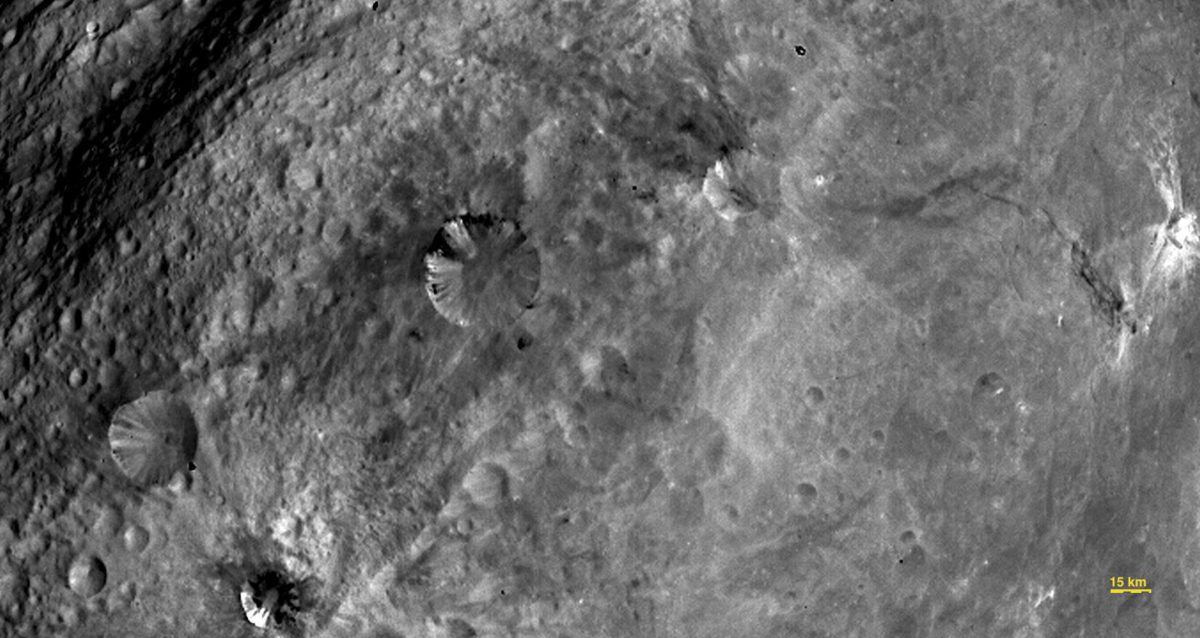Emily Lakdawalla • Aug 02, 2011
On speculation in today's Dawn press briefing
One thing that took me by surprise about today's Dawn press briefing was how the scientists were responding to scientific questions. When a spacecraft has visited a new body for the first time, the usual answer to any scientific question is "it's too early to know; we need to study the data more." Scientists are usually very careful to avoid speculation while they're on press panels. But today's press briefing wasn't like that at all. All three scientists on the panel -- Chris Russell, Holger Sierks, and Enrico Flamini -- were unusually open in their speculation about what the very early data returned from Dawn might mean. They speculated about what might have caused the grooves, they speculated about how the spectral data could be interpreted, they gave early numbers on what age the surface might be based on crater counts (4 billion years). This is such an unusual behavior for scientists on press panels that I, not expecting to get so much in the way of scientific goodies, couldn't catch up with them to write it all down.
After the briefing was over I walked up to Chris Russell and thanked him for being so willing to speculate, and he clapped his hands over his mouth and said "I wasn't supposed to do that!" I don't know him well enough to know whether he was joking or serious (or a little of both). But it's certainly true that you almost never see scientists on a NASA panel throwing so many possible interpretations around.
I think that the reason that scientists are discouraged from doing this is because reporters will tend to write up such speculation as fact even though most early speculative hypotheses will turn out to be partly or entirely wrong. Once the early impressions are corrected, the news articles with the wrong interpretations are never corrected. So I can see why scientists might want to avoid speculation in front of the press.
But I'm glad they did it this time. And possibly not for the reason you think. I'm not trying to get "the answers" -- I know how much speculation made just days after orbit insertion is worth, and that's not very much. It's because the process of speculating -- of observing and brainstorming ideas about what could possibly explain these crazy observations -- is one of the things that makes science so fun. Scientists who have new data to chew on and are trying to puzzle through these things are enjoying themselves, and that comes through on the press panel in happy faces and excited voices, and that, in turn, makes everything that they are talking about seem more exciting to the public. It is so much better than the flat affect and droning voices of scientists holding back, being very careful not to say things they're not supposed to say. So: thanks, Dawn team, for sharing your early ideas about what's going on at Vesta.
Sorry this isn't a substantive post about the Dawn pics. Hopefully I'll get to that later today, or tomorrow. One teaser pic below is of a phenomenon on Vesta that struck Russell as so strange that he didn't have any hypotheses to offer. It's also fun when scientists say "I don't know."

Support our core enterprises
Your support powers our mission to explore worlds, find life, and defend Earth. You make all the difference when you make a gift. Give today!
Donate

 Explore Worlds
Explore Worlds Find Life
Find Life Defend Earth
Defend Earth

